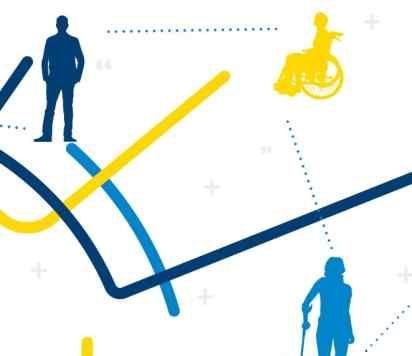Imperial is committed to providing support to ensure staff maximise their potential and progress regardless of disability. To show this commitment, Imperial has become a Disability Confident Leader. This is a government run scheme encouraging employers to think differently about disability, and take action to improve how they recruit, retain and develop disabled people.
main page accordion
Sharing your disability means we can start the process of putting in place any workplace adjustments that you might need. Also, as an organisation, holding more accurate data on staff means Imperial can better check we have the right policies and services in place.
We encourage you to talk to your line manager about any disabilities and to also update your personal information ICIS (under 'My details'). ICIS is Imperial's online employee self-service system. We recommended that you review and update your personal details, including disability, at least once a year.
Your staff record is confidential. ICIS access is only given to specifically authorised persons who must follow Imperial's data protection policy and codes of practice.
This list is not exhaustive and is only meant to serve as a brief guide. There are many other types of disabilities that can affect people in different ways. The important thing to remember is that disability is not a fixed or static label. It is a dynamic and diverse experience that can change over time and in different contexts.
- sensory impairments, such as those affecting sight or hearing
- physical impairments or illnesses that affect mobility, dexterity, or control of movement, for example prolonged use of a wheelchair or crutches, arthritis, multiple sclerosis, or stroke
- developmental conditions, such as dyslexia, dyspraxia, or autistic spectrum disorder (ASD)
- depression, anxiety, eating disorders, obsessive-compulsive disorder, schizophrenia, bipolar affective disorders, as well as personality disorders and some self-harming behaviours
- progressive diseases, such as motor neurone disease, muscular dystrophy, forms of dementia, and lupus
- illnesses with impairments with fluctuating or recurring effects such as myalgic encephalitis [ME], chronic fatigue syndrome [CFS], fibromyalgia, sickle cell anaemia, epilepsy, and diabetes
- facial disfigurements
- HIV infection (from the point of diagnosis even where there is no adverse effect on day-to-day living)
- cancer (from the point of diagnosis even where there is no adverse effect on day-to-day living)
- other long-term illnesses that significantly impair a person’s ability to function, physically and/or mentally. This can be due to the effects of the illness or the effects or demands of treatment, for example needing to attend hospital or taking debilitating or time-consuming treatment.
Under the Equality Act 2010, some specific impairments are excluded from the definition of disability. These include:
- addictions, other than as a result of the substance being medicinally prescribed, for example alcoholism, drug dependency, or smoking addiction
- deliberately inflicted disfigurements such as tattoos which have not been removed, skin piercing, and something attached through such piercing
- seasonal allergic rhinitis (hay fever), except where it aggravates the effect of another impairment such as unstable asthma or severe chronic irreversible airflow limitation
- problems with standard vision, corrected by contact lenses or spectacles.
main page layout
Expand your knowledge
Imperial offers a range of training on disability and neurodiversity:




